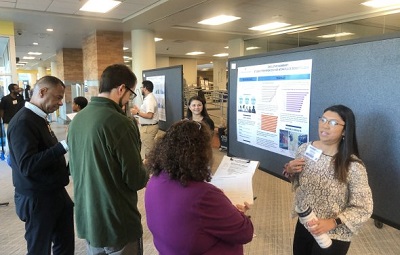Thriving or Coping: The Connection Between Well-Being and Cannabis Motives in College Life
Description/Abstract/Artist Statement
Introduction: Over 40% of both college and non-college young adults reported past year cannabis use in 2022. Furthermore, recent findings suggest that college students’ changes in well-being may be linked to short- and long-term health outcomes. Despite existing interventions to improve psychological well-being, the relationship between overall well-being and cannabis use motives has been unexplored. This study examined associations between overall well-being and cannabis use motives among college students who use cannabis.
Method: Participants were 259 college students (Mage=20.95, SD=5.15; 74.5% female; 52.12% Black) who reported using cannabis in the past 30-days and who were recruited through the psychology department. Well-being was assessed with the PERMA Profiler, a multidimensional scale for flourishing. For this study, we examined overall well-being, which includes five subscales (positive emotion, engagement, relationships, meaning, accomplishment). In addition, the Marijuana Motives Measure includes five subscales (enhancement, conformity, expansion, coping, social) to examine motives for cannabis use (1=almost never/never to 5=almost always/always). A correlation analysis examined associations between overall well-being and cannabis use motives.
Results: On average, participants reported using cannabis on 15.29 days (SD=11.12) during the past 30-days. Overall well-being was associated with coping (r=-.211, p
Discussion: Results indicate that among college students who use cannabis, those who report lower overall well-being tend to be more motivated to use cannabis to cope with negative affect and conform with peers. These findings suggest that it may be beneficial to develop cannabis interventions aim to increase overall well-being, which could decrease coping and conformity cannabis motives.
Faculty Advisor/Mentor
James M. Henson
Faculty Advisor/Mentor Department
Psychology
College Affiliation
College of Sciences
Presentation Type
Poster
Disciplines
Health Psychology
Session Title
Poster Session
Location
Learning Commons Lobby @ Perry Library
Start Date
3-30-2024 8:30 AM
End Date
3-30-2024 10:00 AM
Thriving or Coping: The Connection Between Well-Being and Cannabis Motives in College Life
Learning Commons Lobby @ Perry Library
Introduction: Over 40% of both college and non-college young adults reported past year cannabis use in 2022. Furthermore, recent findings suggest that college students’ changes in well-being may be linked to short- and long-term health outcomes. Despite existing interventions to improve psychological well-being, the relationship between overall well-being and cannabis use motives has been unexplored. This study examined associations between overall well-being and cannabis use motives among college students who use cannabis.
Method: Participants were 259 college students (Mage=20.95, SD=5.15; 74.5% female; 52.12% Black) who reported using cannabis in the past 30-days and who were recruited through the psychology department. Well-being was assessed with the PERMA Profiler, a multidimensional scale for flourishing. For this study, we examined overall well-being, which includes five subscales (positive emotion, engagement, relationships, meaning, accomplishment). In addition, the Marijuana Motives Measure includes five subscales (enhancement, conformity, expansion, coping, social) to examine motives for cannabis use (1=almost never/never to 5=almost always/always). A correlation analysis examined associations between overall well-being and cannabis use motives.
Results: On average, participants reported using cannabis on 15.29 days (SD=11.12) during the past 30-days. Overall well-being was associated with coping (r=-.211, p
Discussion: Results indicate that among college students who use cannabis, those who report lower overall well-being tend to be more motivated to use cannabis to cope with negative affect and conform with peers. These findings suggest that it may be beneficial to develop cannabis interventions aim to increase overall well-being, which could decrease coping and conformity cannabis motives.


